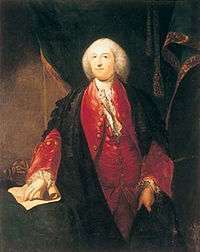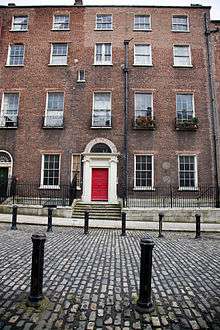John Ponsonby (politician)
Hon. John Ponsonby, PC (Ire) (29 March 1713 – 16 August 1787) was an Anglo-Irish politician.


5 Henrietta Street, Dublin
Biography
Ponsonby was the second son of Brabazon Ponsonby, who was created the Earl of Bessborough in 1739, and his first wife, Sarah Margetson Colvill. He was the grandson of William Ponsonby, 1st Viscount Duncannon.[1]
In 1739, Ponsonby entered the Irish House of Commons for Newtownards, becoming its speaker in 1756. He also served as First Commissioner of the Revenue and he became a member of the Privy Council of Ireland in 1746.[2] In 1761, Ponsonby was elected for Kilkenny County and Armagh Borough, and sat for the first. In 1768, he stood also for Gowran and Newtownards, and in 1776 for Carlow Borough, but chose each time Kilkenny County, which he represented until 1783. Subsequently, Ponsonby was again returned for Newtownards and sat for this constituency until his death in 1787.
Belonging to one of the great families which at this time monopolized the government of Ireland, Ponsonby was one of the principal "undertakers," men who controlled the whole of the king's business in Ireland, and he retained the chief authority until George Townshend, 1st Marquess Townshend became lord-lieutenant in 1767. Then followed a struggle for supremacy between the Ponsonby faction and the party dependent on Townshend, one result of this being that Ponsonby resigned the speakership in 1771.[3]
He married in 1743 Lady Elizabeth Cavendish, daughter of the 3rd Duke of Devonshire, a connection which was of great importance to the Ponsonbys.[3] (His older brother, William Ponsonby, 2nd Earl of Bessborough, had married the Duke's eldest daughter in 1739.) His sons, William Ponsonby, 1st Baron Ponsonby of Imokilly, and George Ponsonby, were also politicians of distinction. His daughter Catherine married Richard Boyle, 2nd Earl of Shannon, and was mother to Henry Boyle, 3rd Earl of Shannon.[1]
References
- Mosley, Charles, ed. (2003). Burke's Peerage, Baronetage & Knighthood (107 ed.). Burke's Peerage & Gentry. pp. 360–361. ISBN 0-9711966-2-1.
- Chisholm 1911.
-

| Parliament of Ireland | ||
|---|---|---|
| Preceded by Sir John Vesey, 2nd Bt Robert Jocelyn |
Member of Parliament for Newtownards 1739–1760 With: Sir John Vesey, 2nd Bt 1739–1750 Chambre Brabazon Ponsonby 1750–1760 |
Succeeded by Richard Ponsonby Redmond Morres |
| Preceded by Henry Flood Patrick Wemys |
Member of Parliament for Kilkenny County 1761–1783 With: James Agar 1761–1776 Hon. Edmund Butler 1776–1779 Joseph Deane 1779–1783 |
Succeeded by William Brabazon Ponsonby Hon. Henry Welbore Agar |
| Preceded by Edward Knatchbull Francis Russell, Marquess of Tavistock |
Member of Parliament for Armagh Borough 1761 With: Robert Cuninghame |
Succeeded by Robert Cuninghame Hon. Barry Maxwell |
| Preceded by George Dunbar William Henry Burton |
Member of Parliament for Gowran 1768–1769 With: James Agar |
Succeeded by Arthur Browne Henry Prittie |
| Preceded by Richard Ponsonby Redmond Morres |
Member of Parliament for Newtownards 1768–1769 With: Thomas Le Hunt |
Succeeded by Thomas Le Hunt Sir William Morres, 1st Bt |
| Preceded by Edward Hoare James Somerville |
Member of Parliament for Carlow Borough 1776 With: John Prendergast |
Succeeded by John Prendergast Arthur Dawson |
| Preceded by William Brabazon Ponsonby Lodge Evans Morres |
Member of Parliament for Newtownards 1783–1787 With: George Lowther 1783–1785 Sir William Morres, 3rd Bt 1785–1787 |
Succeeded by Henry Alexander Sir William Morres, 3rd Bt |
| Political offices | ||
| Preceded by Henry Boyle |
Speaker of the Irish House of Commons 1756–1771 |
Succeeded by Edmund Sexton Pery |